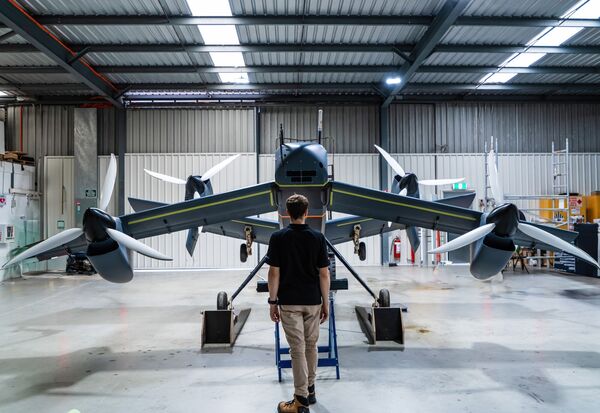
The STRIX Uncrewed Aerial System has an anticipated range of 540 km, carrying a 200 kg payload. (BAE Systems Australia)
The first test flight of BAE Systems Australia‘s (BAESA's) STRIX Uncrewed Aerial System is scheduled for mid-October, with the company citing the vertical take-off and landing (VTOL) platform as a unique combination of operation, range, and payload.
Flight testing for the prototype, X-wing design was approved in July by Australia's Civil Aviation Safety Authority (CASA) and will take place at an undisclosed site in Western Australia.
“Some whiteboard sketches and ideas were thrown around in June/July 2022 but the final design/concept for STRIX was not finalised until March 2023. So, we'll have gone from concept design to first flight of a first-of-type prototype within 18 months,” Kisa Christensen, director of Red Ochre Autonomy and Sensors at BAESA, told Janes . “We're taking a staged approach in the lead-up to the first full-blown flight.”
She added, “We're starting with the nose-up manoeuvre, then we'll couple that with a vertical take-off and hover, followed by a vertical landing. The final test flight will implement transition from a hover to conventional flight and then back to hover and a vertical landing. So, the platform's full flight characteristics will be involved.
“Then we will progress to our next spiral, which focuses on testing the unique hybrid propulsion that powers this concept. This will enable realisation of the full range capability that can be achieved through STRIX's efficient fixed-wing cruise.”
Developed in collaboration with Australian firm Innovaero, STRIX's versatility is claimed as one of its assets. Potential multirole mission capabilities include strike, intelligence, surveillance, and reconnaissance, assured targeting, antisubmarine and anti-surface warfare, electronic warfare, and teaming with rotary-wing platforms.
Looking to read the full article?
Gain unlimited access to Janes news and more...







